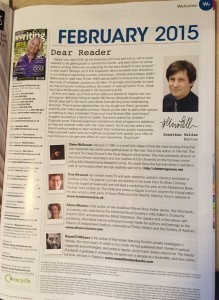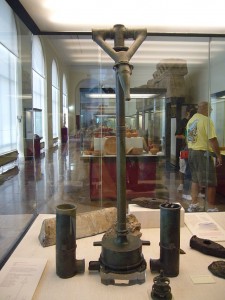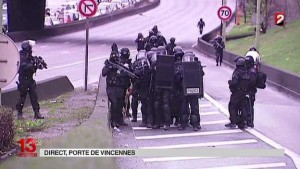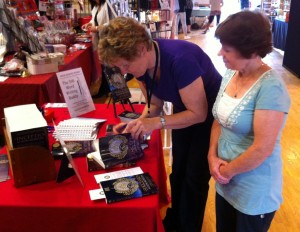 It’s a funny time to be pursuing a writing career, but an exciting one. All authors, apart from the biggest names, need to publicise their own books whether they’re self-published, small press or even big house published. It’s a funny time to be pursuing a writing career, but an exciting one. All authors, apart from the biggest names, need to publicise their own books whether they’re self-published, small press or even big house published.
Writing Magazine commissioned me to write a piece about how to seek and find recognition in today’s fiercely competitive publishing marketplace.
I set out what I had done and what had worked for me – a ‘how to’ list in very practical terms!
Define your goals and satisfaction levels
How to measure recognition
The seven interlinked tactics
Social media/’platform’
Endorsements
Reviews
Awards
Memberships
Press/online articles
Events
The inner secret…
 It was also a good exercise for me to review my own objectives for 2015! I called on writing colleagues to contribute experience on some of the subjects – a practical example of writers collaborating! It was also a good exercise for me to review my own objectives for 2015! I called on writing colleagues to contribute experience on some of the subjects – a practical example of writers collaborating!
Each author is different with different time and money resources, and can’t do everything, but I hope I’ve planted a few seeds.
Here’s how it starts:
“Congratulations! Your book is out! Perhaps it’s the second or third one and your self-publishing career is on track. But are you being taken seriously as a published author and regarded as a professional writer along with your peers? This is one of the most vexing questions for self-publishers today….”
You can read the full article in the February edition of Writing Magazine. It’s out now and available at most newsagents.
Alison Morton is the author of Roma Nova thrillers, INCEPTIO, and PERFIDITAS. Third in series, SUCCESSIO, is now out and Book 4 is in the editing process!
Find out about Roma Nova book progress, news, writing tips and info by signing up for my free monthly email newsletter.
If you enjoyed this post, do share it with your friends!Like this:Like Loading...
Thinking about police, gendarmes and emergency services in the past few days brought me to the law enforcers of Ancient Rome. Faced with terrorist attack (or riot, revolt and rebellion), they would have been robust in their attitude and actions. So who policed Rome?
 Portable Roman fire engine nozzle, Madrid Museum (Creative Commons) Vigiles as a public service were founded by Augustus as a new firefighting force to replace the private, often haphazard, groups. In AD 6, he levied a 4% tax on the sale of slaves to finance the service. They were commanded by the praefectus vigilum, who was of equestrian rank, and organised into seven cohorts of 500, later 1,000 men, each commanded by a tribune. A cohort would patrol two of the city’s fourteen administrative districts (regiones) from sub-stations throughout the city, plus detachments were stationed at Rome’s ports of Ostia and Portus.
Vigiles were dual role: they also acted as a night watch, keeping an eye out for burglars, cut-throats and low-life, and hunting down runaway slaves. Sometimes, they were used to maintain order in the streets. As well as the power to break into houses if they suspected an out-of-control fire inside, and demolish property to create firebreaks, vigiles could also check if householders had firefighting equipment and a ready reserve of water. If not, householders could be punished for negligence. So there was an element of preventative work as well as powers of investigation and enforcement…
In their firefighting role, the vigiles had a variety of specialist troops such as sifonarii, who worked the pumps, uncinarii, men who used grappling hooks, aquarii who identified and supervised the supply of water. As with true military forces, the vigiles enjoyed the benefit of their own medical support with four doctors (medici) attached to each cohort. The ordinary firefighters were called milites (soldiers).
For firefighting, the vigiles used quilts or mats, (most likely soaked in water and used to smother flames), ladders, axes, fire buckets made of rope treated with pitch, poles and hooks to push and pull over fire damaged walls. The height of sophistication was a sipho, a fire engine, pulled by horses and consisting of a large double-action pump that was partially submerged in a reservoir of water and fitted with a directional nozzle.
 Recruited from the lower levels of Roman society, often ex-slaves, vigiles were not as highly regarded as their other policing colleagues. But their job wasn’t easy… Recruited from the lower levels of Roman society, often ex-slaves, vigiles were not as highly regarded as their other policing colleagues. But their job wasn’t easy…
I heartily recommend reading Lindsey Davis’ Falco series which features Petro (Lucius Petronius Longus), a vigiles watch captain in charge of a disparate lot and who helps main hero Falco investigate dastardly deeds in Ancient Rome.
Cohortes urbanae, also created by the ever busy Augustus, were formed to counterbalance the enormous power of the Praetorian Guard. The cohorts’primary role was to police Rome and to counteract the roaming mobs and gangs that so often haunted its streets during the Republic. These urban cohorts thus acted as a heavy duty police force, capable of riot control duties, while their contemporaries, the vigiles, had the day-to-day role of policing the streets and protecting against fires.
 Augustus Originally, the cohortes urbanae were divided into three cohorts of around 500 men, each commanded by a tribune and six centurions. In the time of the Flavians (Vespasian, Titus and Domitian), this increased to four cohorts. Only free citizens, mainly of Italian origin, were eligible to serve in their ranks.
The man in charge of all the cohortes urbanae was the urban prefect (praefectus urbanus or praefectus urbi), a magistrate tasked with maintaining order in the city and within a hundred mile circumference. He was also tasked with administering the emperor’s laws, superintending guilds and corporations (collegia), overseeing officials responsible for the drainage of the Tiber and the maintenance of the city’s sewers and water supply system, as well as its monuments. Most importantly, he was ultimately responsible for the city’s provision with grain from overseas for the city’s large population; if the prefect failed to secure adequate supplies, riots usually broke out.
Urban cohorts, (known as city cohorts in non-Roman cities) were later created in both the Roman North African city of Carthage and the city of Lugdunum in Roman Gaul (modern Lyon).
 Symmachus In Late Antiquity, when the imperial court moved from Rome itself, the office of urban prefect became more powerful, as it was no longer under the emperor’s direct supervision or even his eye. Interestingly, from the Roma Nova angle, the office was usually held by leading members of Italy’s still largely pagan senatorial aristocracy. In such a capacity, Symmachus played a prominent role in the controversy over the Altar of Victory in the late 4th century.
So there are some parallels and overlaps with modern day services. In the UK, police (regionally based), military, fire brigades and ambulance/paramedic services are separate. Here in France, there are two police services – municipal (local) and gendarmerie (paramilitary). Ambulances are organised privately and publicly, but it’s a firefighter who is likely to arrive first at an accident and carry out paramedic services.
Alison Morton is the author of Roma Nova thrillers, INCEPTIO, and PERFIDITAS. Third in series, SUCCESSIO, is now out.
Find out about Roma Nova news, writing tips and info by signing up for my free monthly email newsletter.
If you enjoyed this post, do share it with your friends!Like this:Like Loading...
 Driving along the main road, I’m happy there are only 11 kilometres to home. I slow down to pass through a village of older cream stone grey-slated houses, interspersed with Roman tile roofed single-storey homes. Halfway through, I reach the open area to the side, not even a proper village square. A blue-uniformed armed figure steps into the road. He holds up one hand; his other grips a service rifle. Driving along the main road, I’m happy there are only 11 kilometres to home. I slow down to pass through a village of older cream stone grey-slated houses, interspersed with Roman tile roofed single-storey homes. Halfway through, I reach the open area to the side, not even a proper village square. A blue-uniformed armed figure steps into the road. He holds up one hand; his other grips a service rifle.
I have to stop.
No, I’m not writing as my heroine Carina, and this is not a Roma Novan custos, possibly an ex-colleague of Carina’s. This is France today.
 Faced with a mass slaughter of journalists from satirical magazine Charlie Hebdo, a siege with hostages in a small town where fugitive terrorist killers armed with Kalashnikovs are determined to die as martyrs, and another armed siege at a kosher supermarket in a densely inhabited eastern part of Paris, French forces of law and order mobilise throughout the country. Regular police, the military style gendarmes, special forces, the CRS, police judiciare, fire brigades, ambulances and the military swarm in large numbers. At the crisis sites, they encircle, they clear, they evacuate civilians. Defending free and open speech, they allow journalists in, but never at operational risk. Their determination and focus are Praetorian, their manner direct, robust, often brusk. Faced with a mass slaughter of journalists from satirical magazine Charlie Hebdo, a siege with hostages in a small town where fugitive terrorist killers armed with Kalashnikovs are determined to die as martyrs, and another armed siege at a kosher supermarket in a densely inhabited eastern part of Paris, French forces of law and order mobilise throughout the country. Regular police, the military style gendarmes, special forces, the CRS, police judiciare, fire brigades, ambulances and the military swarm in large numbers. At the crisis sites, they encircle, they clear, they evacuate civilians. Defending free and open speech, they allow journalists in, but never at operational risk. Their determination and focus are Praetorian, their manner direct, robust, often brusk.
Today, I watch on the television as they take control and ‘neutralise’ both incidents.The operations are efficiently led and executed. The perpetrators are dead. And then as the hostages are released from the supermarket siege in the east of Paris, something very strange happens. Applause breaks out. Not from the traumatised ex-hostages – they are out of it – but from bystanders. This is weird because the police are not particularly loved, particularly in areas with largely ethnic populations.
 When the Kouachi brothers slaughtered 12 people in their attack at the offices of Charlie Hebdo, French people saw this not only as the brutal deaths of human beings, but as an assault on the freedom of expression – la liberté d’expression. As inheritors of Voltaire as well as children of the Revolution, they cherish this freedom above many others. And they are showing solidarity with Charlie Hebdo in their hundreds of thousands in fine French tradition of street demonstration. They wave signs, ‘Je suis Charlie’, and shout Liberté! And it will continue over the weekend. When the Kouachi brothers slaughtered 12 people in their attack at the offices of Charlie Hebdo, French people saw this not only as the brutal deaths of human beings, but as an assault on the freedom of expression – la liberté d’expression. As inheritors of Voltaire as well as children of the Revolution, they cherish this freedom above many others. And they are showing solidarity with Charlie Hebdo in their hundreds of thousands in fine French tradition of street demonstration. They wave signs, ‘Je suis Charlie’, and shout Liberté! And it will continue over the weekend.
And my roadside stop today? The gendarme bent down, looked through my window, then waved me on. I didn’t look like a security threat, then. To some, these armed officers of the state, solemn in their dark blue, may seem intimidating, but I feel safer for their presence and was glad to be stopped.
Alison Morton is the author of Roma Nova thrillers, INCEPTIO, and PERFIDITAS. Third in series, SUCCESSIO, is now out.
Find out about Roma Nova news, writing tips and info by signing up for my free monthly email newsletter.
If you enjoyed this post, do share it with your friends!Like this:Like Loading...
 Readers buy books from many places; paperbacks from ‘bricks and mortar’ bookshops, airports, souvenir shops at visitor sites, at events, launches, the charity shop, from the author direct as well as online. As for ebooks, there seems no end to the number and variety of e-tailers, the dominant one being Amazon. Readers buy books from many places; paperbacks from ‘bricks and mortar’ bookshops, airports, souvenir shops at visitor sites, at events, launches, the charity shop, from the author direct as well as online. As for ebooks, there seems no end to the number and variety of e-tailers, the dominant one being Amazon.
Sometimes we forget that Amazon is not the only ebook gladiator in the arena; there are other choices, e.g. iTunes, Nook (Barnes & Noble) and Kobo, plus aggregators like Smashwords. An Ofcom study into consumers’ digital consumption has found that Amazon had a dominant 79% share of the e-book market in the UK (67% in the US – The Future of Ink).
 Apple’s iBookstore was the second most-used e-book platform in the UK with Barnes & Noble’s Nook giving iBooks a close contest in the US. And Kobo, the Canadian company was very much in marketing mode at the London Book Fair in April. New independent players such as Libiro are popping up giving readers another option. Apple’s iBookstore was the second most-used e-book platform in the UK with Barnes & Noble’s Nook giving iBooks a close contest in the US. And Kobo, the Canadian company was very much in marketing mode at the London Book Fair in April. New independent players such as Libiro are popping up giving readers another option.

Independent bookshops are the Aladdin’s cave, with knowledgeable and enthusiastic staff, from Foyles in London and Bristol to the smallest local owner/manager shop. You can find your local (UK) bookshop here:
So the choice is yours. Of course, all the Roma Nova titles are on these other platforms, here are the links for INCEPTIO to get you started:
Of course, if you’re an Amazon (Kindle) reader, don’t let me stop you… 😉
Alison Morton is the author of Roma Nova thrillers, INCEPTIO, and PERFIDITAS. Third in series, SUCCESSIO, is now out.
Find out about Roma Nova news, writing tips and info by signing up for my free monthly email newsletter.
If you enjoyed this post, do share it with your friends!Like this:Like Loading...
 No, I’m not making resolutions for 2015; they are easily made and easily broken. It’s a bit like dieting – it never works. No, I’m not making resolutions for 2015; they are easily made and easily broken. It’s a bit like dieting – it never works.
So what’s a writer to do? I have a few recommendations…
- Have your vision and write your story – tap, tap, tap.
- Make a beautiful world or an ugly one – it doesn’t matter as long as you know that world in your head and make it plausible and consistent.
- Make heroic characters or complete slimeballs and every type in between – don’t be afraid to create the characters you want to and as complex as you want them. Not all police are alcoholic depressives, not all decent ordinary people are upright citizens and not all heroes/heroines are ‘on duty’ 24/7.
- And have confidence in creating this new world – who says you can’t have a certain world? But remember to be logical and to do your research.
- And love it when it’s a success – don’t do the over-modest reserved thing. A mumbled ‘thank you’ or ‘it was nothing’ is not gracious. Your friends, colleagues and even your relations want to celebrate with you.
 Writers together  But let’s remember a few things… But let’s remember a few things…
- It’s a privilege to be able to present the inside of your head to other people.
- Be nice to other writers and exchange ideas freely with them, support them with promotion and cheer them up when they need it.
- Be polite to others in the writing and publishing field. Nobody is right or wrong – there are always options and the power to choose.
- Appreciate your readers, librarians, booksellers, bloggers and reviewers.
- And use your experience to help newcomers. Remember how others helped you?
Now, sit down and write the next damned book!
Alison Morton is the author of Roma Nova thrillers, INCEPTIO, and PERFIDITAS. Third in series, SUCCESSIO, is now out.
Find out about Roma Nova news, writing tips and info by signing up for my free monthly email newsletter.
If you enjoyed this post, do share it with your friends!Like this:Like Loading...
|
Subscribe to Blog via Email
Join 50 other subscribers.
Categories
Archive
|
 It’s a funny time to be pursuing a writing career, but an exciting one. All authors, apart from the biggest names, need to publicise their own books whether they’re self-published, small press or even big house published.
It’s a funny time to be pursuing a writing career, but an exciting one. All authors, apart from the biggest names, need to publicise their own books whether they’re self-published, small press or even big house published. It was also a good exercise for me to review my own objectives for 2015! I called on writing colleagues to contribute experience on some of the subjects – a practical example of writers collaborating!
It was also a good exercise for me to review my own objectives for 2015! I called on writing colleagues to contribute experience on some of the subjects – a practical example of writers collaborating!





















